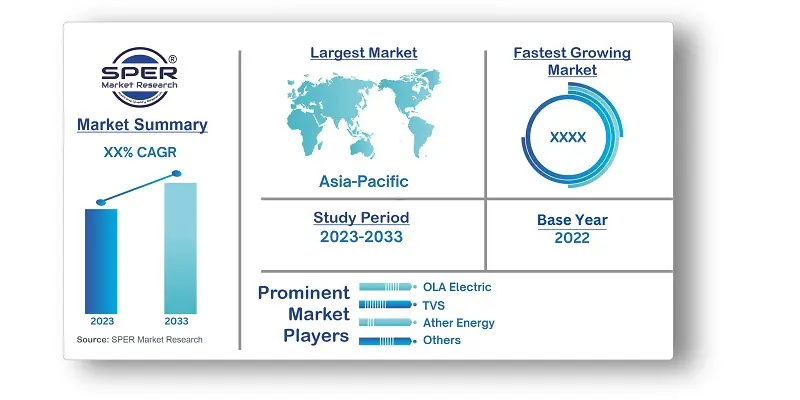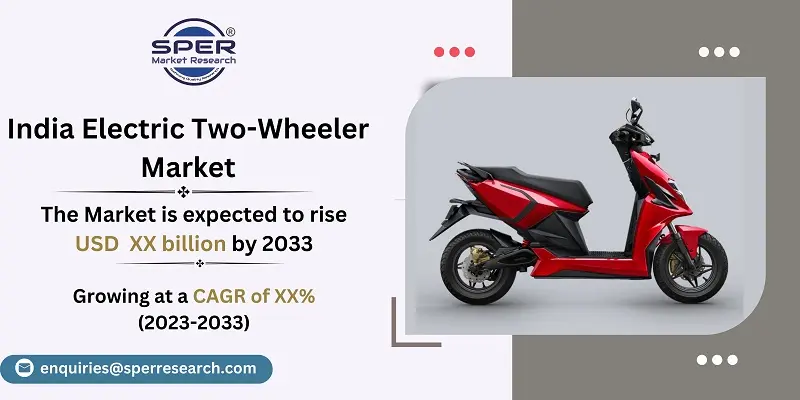
India Electric Two-Wheeler Market Growth, Size, Trends, Demand, Revenue and Future Competition
India Electric Two-Wheeler Market Size- By Type, By Battery Type, By Voltage- Regional Outlook, Competitive Strategies and Segment Forecast to 2033
| Published: Feb-2024 | Report ID: AMIN2468 | Pages: 1 - 106 | Formats*: |
| Category : Automotive & Transportation | |||


| Report Metric | Details |
| Market size available for years | 2020-2033 |
| Base year considered | 2023 |
| Forecast period | 2024-2033 |
| Segments covered | By Type, By Battery Type, By Voltage |
| Regions covered | Eastern Region, Western Region, Norther Region, Southern Region |
| Companies Covered | OLA Electric, TVS, Ather Energy, Bajaj, Ampere Greaves, Okinawa, Hero Electric, BGauss, Others. |
- Consumers
- Government and Regulatory Bodies
- Automakers and Manufacturers
- Investors and Financial Institutions
- Charging Infrastructure Providers
- Technology and Component Suppliers
- Environmental Organizations
| By Type: |
|
| By Battery Type: |
|
| By Voltage: |
|
- India Electric Two-Wheeler Market Size (FY’2024-FY’2033)
- Overview of India Electric Two-Wheeler Market
- Segmentation of India Electric Two-Wheeler Market By Type (Electric Motorcycles, Electric Scooters)
- Segmentation of India Electric Two-Wheeler Market By Battery Type (Sealed Lead Acid, Li-ion, Others)
- Segmentation of India Electric Two-Wheeler Market By Voltage (36V, 24V, 48V, More than 48V)
- Expansion Analysis of India Electric Two-Wheeler Market
- Problems and Obstacles in India Electric Two-Wheeler Market
- Competitive Landscape in the India Electric Two-Wheeler Market
- Impact of COVID-19 and Demonetization on India Electric Two-Wheeler Market
- Details on Current Investment in India Electric Two-Wheeler Market
- Competitive Analysis of India Electric Two-Wheeler Market
- Prominent Players in the India Electric Two-Wheeler Market
- SWOT Analysis of India Electric Two-Wheeler Market
- India Electric Two-Wheeler Market Future Outlook and Projections (FY’2024-FY’2033)
- Recommendations from Analyst
1.1. Scope of the report1.2. Market segment analysis
2.1. Research data source2.1.1. Secondary Data2.1.2. Primary Data2.1.3. SPER’s internal database2.1.4. Premium insight from KOL’s2.2. Market size estimation2.2.1. Top-down and Bottom-up approach2.3. Data triangulation
4.1. Driver, Restraint, Opportunity and Challenges analysis4.1.1. Drivers4.1.2. Restraints4.1.3. Opportunities4.1.4. Challenges4.2. COVID-19 Impacts of the India Electric Two-Wheeler Market
5.1. SWOT Analysis5.1.1. Strengths5.1.2. Weaknesses5.1.3. Opportunities5.1.4. Threats5.2. PESTEL Analysis5.2.1. Political Landscape5.2.2. Economic Landscape5.2.3. Social Landscape5.2.4. Technological Landscape5.2.5. Environmental Landscape5.2.6. Legal Landscape5.3. PORTER’s Five Forces5.3.1. Bargaining power of suppliers5.3.2. Bargaining power of buyers5.3.3. Threat of Substitute5.3.4. Threat of new entrant5.3.5. Competitive rivalry5.4. Heat Map Analysis
6.1. India Electric Two-Wheeler Market Manufacturing Base Distribution, Sales Area, Product Type6.2. Mergers & Acquisitions, Partnerships, Product Launch, and Collaboration in India Electric Two-Wheeler Market
7.1. India Electric Two-Wheeler Market Value Share and Forecast, By Type, 2023-20337.2. Electric Motorcycles7.3. Electric Scooters
8.1. India Electric Two-Wheeler Market Value Share and Forecast, By Battery Type, 2024-20338.2. Sealed Lead Acid8.3. Li-ion8.4. Others
9.1. India Electric Two-Wheeler Market Value Share and Forecast, By Voltage, 2024-20339.2. 36V9.3. 24V9.4. 48V9.5. More than 48V
10.1. India Electric Two-Wheeler Market Size and Market Share
11.1. India Electric Two-Wheeler Market Size and Market Share By Type (2020-2026)11.2. India Electric Two-Wheeler Market Size and Market Share By Type (2027-2033)
12.1. India Electric Two-Wheeler Market Size and Market Share By Battery Type (2020-2026)12.2. India Electric Two-Wheeler Market Size and Market Share By Battery Type (2027-2033)
13.1. India Electric Two-Wheeler Market Size and Market Share By Voltage (2020-2026)13.2. India Electric Two-Wheeler Market Size and Market Share By Voltage (2027-2033)
14.1. India Electric Two-Wheeler Market Size and Market Share By Region (2020-2026)
14.2. India Electric Two-Wheeler Market Size and Market Share By Region (2027-2033)14.3. Eastern Region14.4. Western Region14.5. Norther Region14.6. Southern Region
15.1. OLA Electric15.1.1. Company details15.1.2. Financial outlook15.1.3. Product summary15.1.4. Recent developments15.2. TVS15.2.1. Company details15.2.2. Financial outlook15.2.3. Product summary15.2.4. Recent developments15.3. Ather Energy15.3.1. Company details15.3.2. Financial outlook15.3.3. Product summary15.3.4. Recent developments15.4. Bajaj.15.4.1. Company details15.4.2. Financial outlook15.4.3. Product summary15.4.4. Recent developments15.5. Ampere Greaves15.5.1. Company details15.5.2. Financial outlook15.5.3. Product summary15.5.4. Recent developments15.6. Okinawa.15.6.1. Company details15.6.2. Financial outlook15.6.3. Product summary15.6.4. Recent developments15.7. Hero Electric15.7.1. Company details15.7.2. Financial outlook15.7.3. Product summary15.7.4. Recent developments15.8. BGauss15.8.1. Company details15.8.2. Financial outlook15.8.3. Product summary15.8.4. Recent developments15.9. Others
SPER Market Research’s methodology uses great emphasis on primary research to ensure that the market intelligence insights are up to date, reliable and accurate. Primary interviews are done with players involved in each phase of a supply chain to analyze the market forecasting. The secondary research method is used to help you fully understand how the future markets and the spending patterns look likes.
The report is based on in-depth qualitative and quantitative analysis of the Product Market. The quantitative analysis involves the application of various projection and sampling techniques. The qualitative analysis involves primary interviews, surveys, and vendor briefings. The data gathered as a result of these processes are validated through experts opinion. Our research methodology entails an ideal mixture of primary and secondary initiatives.



Frequently Asked Questions About This Report
PLACE AN ORDER
Year End Discount
Sample Report
Pre-Purchase Inquiry
NEED CUSTOMIZATION?
Request CustomizationCALL OR EMAIL US
100% Secure Payment






Related Reports
Our Global Clients
Our data-driven insights have influenced the strategy of 200+ reputed companies across the globe.




















